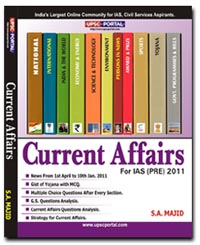
Current Affairs Book For IAS Pre
2011 By S.A. Majid
SAMPLE
QUESTION:
1. Consider the following statements :
- The right to education Act, 2009 that became effective from (1st April )
makes elementry education a fundamental right under Article 21 (A) of the
Constitution.
- As per the Act, Private educational institutions should reserve 33%
seats for children from the weaker sections of Society.
Which of the above statements is/ are incorrect ?
(a) 1 only
(b) 2 only
(c) Both 1 and 2
(d) Neither 1 nor 2
2. Consider the following statements
- On April 1, 2010 India launched census 2011. The biggest - ever Census
attempted in the history of mankind.
- The first ever National Population Register (NRR) Will also be Prepared
in which all person aged over 15 year will be photo graphed and finger
printed to create a biometric national database.
- It is the 13th National Census exercise Since 1872.
- The Census is a statutory exercise conducted under the provisions of the
census Act 1948. Where as the NPR (National Population Register) is being
created under the provisions of the citizenship Act 1955. and citizenship
Rules (Registration of Citizens and Issue of national Identity cards ) 2003.
Which of the above statement is/are correct ?
(a) 1 and 4
(b) 1, 3 and 4
(c) 1, 2 and 3
(d) 1, 2 and 4
3. Which of the statements is incorrect ?
(a) The national Integration council is chaired by Home Minister.
(b) Set up in the early 60’s by Prime minister Nehru, the NIC held its first
meeting in 1962.
(c) The NIC aims at finding ways and means to combat the menace of communalism,
casteism and regionalism.
(d) The NIC has 147 members, including union ministers, leaders of opposition in
the lok sabha and Rajy sabha and Chief ministers of all states.
4. Which of the statement is incorrect ?
(a) The Green India mission, part of India’s plan to fight climate change,
proposed to double the area being taken up for afforestation and eco-restoration
over the next decade.
(b) This mission is one of the eight mission of the national Action plan on
climate change.
(c) The new and restored forest areas under the mission will act. as a carbon
sink. It means that India’s forests will be able to absorb 6.35% of the
country’s annual emissions by 2020.
(d) This mission will be headed by prime minister of India.